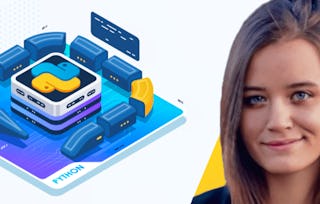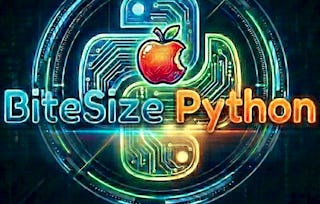Commencez votre voyage Python avec ce cours, où vous obtiendrez une base solide dans ce langage puissant. Apprenez à travailler avec des variables et des types de données pour stocker et traiter des informations, à maîtriser les opérations pour effectuer des calculs et des comparaisons, et à exploiter la puissance des chaînes pour la manipulation de texte. Grâce à des études de cas pratiques, comme la création d'un système de caisse, le partage des pourboires et le calcul des intérêts composés, vous appliquerez vos compétences à la résolution de problèmes de la vie réelle. Ce cours adapté aux débutants est parfait pour tous ceux qui cherchent à développer des compétences pratiques de codage et à prendre confiance en Python.

BiteSize Python pour les débutants absolus : L'essentiel

BiteSize Python pour les débutants absolus : L'essentiel
Ce cours fait partie de Spécialisation BiteSize Python pour les débutants absolus

Instructeur : Di Wu
Inclus avec
10 reviews
Ce que vous apprendrez
Données en cours d'utilisation d'éléments fondamentaux de la programmation Python, notamment les variables, les types de données et les fonctions d'entrée/sortie de base
Effectuer des opérations arithmétiques, relationnelles et logiques, et manipuler des chaînes de caractères
Analyser et créer des programmes Python pour résoudre des problèmes du monde réel
Compétences que vous acquerrez
- Catégorie : Langages de script
- Catégorie : Scripting
- Catégorie : Outils de programmation informatique
- Catégorie : Programmation en Python
- Catégorie : Principes de programmation
- Catégorie : Jupyter
- Catégorie : Fichier E/S
Détails à connaître

Ajouter à votre profil LinkedIn
6 devoirs
Découvrez comment les employés des entreprises prestigieuses maîtrisent des compétences recherchées

Élaborez votre expertise du sujet
- Apprenez de nouveaux concepts auprès d'experts du secteur
- Acquérez une compréhension de base d'un sujet ou d'un outil
- Développez des compétences professionnelles avec des projets pratiques
- Obtenez un certificat professionnel partageable

Il y a 6 modules dans ce cours
Ce module présente les bases de Python, en soulignant pourquoi c'est un langage de programmation populaire et comment commencer à l'apprendre. Il couvre les différences entre Python script et Python interactif, explique pourquoi Python est préféré, et présente les Bloc-notes Jupyter comme un outil puissant pour le codage. En outre, il explore les distinctions entre les environnements de codage locaux et basés sur le cloud, y compris la configuration spécifique utilisée dans les Coursera Labs.
Inclus
11 lectures1 devoir
Ce module explore les bases de l'entrée et de la sortie en Python. En commençant par l'exemple classique "Hello, World !" à l'aide de la fonction print(), il explique les différences entre les guillemets simples, doubles et triples en Python. Le module couvre également la manière d'imprimer plusieurs valeurs simultanément et introduit la fonction input() pour recevoir les entrées de l'utilisateur. Les apprenants verront comment combiner input() et print() pour créer des programmes interactifs simples.
Inclus
1 lecture1 devoir6 laboratoires non notés
Ce module présente les variables en Python, y compris la façon de les définir et les règles pour les nommer correctement selon la syntaxe et les conventions. Il couvre les types de données fondamentaux - les entiers (int), les nombres à virgule flottante (float) et les chaînes de caractères (str) - et explique comment convertir ces types à l'aide des fonctions de conversion intégrées de Python.
Inclus
5 lectures2 devoirs2 laboratoires non notés
Ce module se concentre sur les différents types d'opérations en Python, y compris les opérations d'affectation, arithmétiques, relationnelles et logiques. Il explique comment utiliser ces opérations pour manipuler les données et effectuer des comparaisons dans les programmes Python, en fournissant une compréhension fondamentale de la façon dont les données sont traitées et évaluées.
Inclus
1 lecture1 devoir4 laboratoires non notés
Ce module se penche sur le Type de données str en Python, couvrant tout depuis les bases de ce qu'est une chaîne jusqu'à la façon de créer, d'accéder et de manipuler les chaînes. Il inclut des techniques de découpage, de concaténation et de formatage des chaînes, ainsi qu'un aperçu des méthodes de chaînes courantes qui simplifient les tâches de traitement de texte.
Inclus
2 lectures1 devoir6 laboratoires non notés
Ce module applique les concepts essentiels de Python à travers des études de cas pratiques, démontrant comment résoudre des problèmes de la vie réelle en utilisant les compétences acquises dans les modules précédents. Les études de cas incluent un système de caisse pour calculer les coûts totaux, une application de partage des pourboires pour répartir équitablement les pourboires entre les convives, et une calculatrice d'intérêts composés pour la planification financière.
Inclus
1 lecture3 laboratoires non notés
Obtenez un certificat professionnel
Ajoutez ce titre à votre profil LinkedIn, à votre curriculum vitae ou à votre CV. Partagez-le sur les médias sociaux et dans votre évaluation des performances.
Instructeur

Offert par
En savoir plus sur Analyse des Données
 Statut : Essai gratuit
Statut : Essai gratuit Statut : Essai gratuit
Statut : Essai gratuitKodeKloud
 Statut : Essai gratuit
Statut : Essai gratuitUniversity of Colorado Boulder
 Statut : Essai gratuit
Statut : Essai gratuit
Pour quelles raisons les étudiants sur Coursera nous choisissent-ils pour leur carrière ?

Felipe M.

Jennifer J.

Larry W.

Chaitanya A.
Avis des étudiants
- 5 stars
90 %
- 4 stars
10 %
- 3 stars
0 %
- 2 stars
0 %
- 1 star
0 %
Affichage de 3 sur 10
Révisé le 30 avr. 2025
Great format. Took me a minute to figure out the lab controls, but once I did I love it.
Révisé le 27 mai 2025
Good class with a steay building of lessons and understanding.
Révisé le 15 mars 2025
The content is straightforward and applies real life challenges.

Ouvrez de nouvelles portes avec Coursera Plus
Accès illimité à 10,000+ cours de niveau international, projets pratiques et programmes de certification prêts à l'emploi - tous inclus dans votre abonnement.
Faites progresser votre carrière avec un diplôme en ligne
Obtenez un diplôme auprès d’universités de renommée mondiale - 100 % en ligne
Rejoignez plus de 3 400 entreprises mondiales qui ont choisi Coursera pour les affaires
Améliorez les compétences de vos employés pour exceller dans l’économie numérique
Foire Aux Questions
Pour accéder aux supports de cours, aux devoirs et pour obtenir un certificat, vous devez acheter l'expérience de certificat lorsque vous vous inscrivez à un cours. Vous pouvez essayer un essai gratuit ou demander une aide financière. Le cours peut proposer l'option "Cours complet, pas de certificat". Cette option vous permet de consulter tous les supports de cours, de soumettre les évaluations requises et d'obtenir une note finale. Cela signifie également que vous ne pourrez pas acheter un certificat d'expérience.
Lorsque vous vous inscrivez au cours, vous avez accès à tous les cours de la spécialisation et vous obtenez un certificat lorsque vous terminez le travail. Votre certificat électronique sera ajouté à votre page Réalisations - de là, vous pouvez imprimer votre certificat ou l'ajouter à votre profil LinkedIn.
Oui, pour certains programmes de formation, vous pouvez demander une aide financière ou une bourse si vous n'avez pas les moyens de payer les frais d'inscription. Si une aide financière ou une bourse est disponible pour votre programme de formation, vous trouverez un lien de demande sur la page de description.
Plus de questions
Aide financière disponible,

